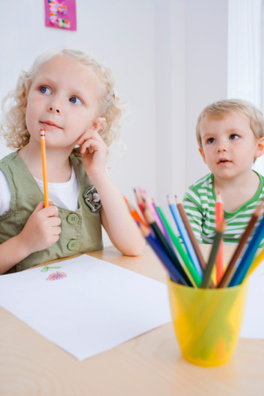
The early years of school are the biggest influence, outside family, where we develop lifelong habits of relating that persist into adulthood.
Our initial experiences as a child with teachers, peers,
and the environment itself informs our understanding about how to relate to ourselves,
our work, the world around us, and other people.
The answers our children find in school to the following questions will indicate if school is providing the exciting, stimulating, and happy learning experience it should be.
Is it safe to have my feelings?
Will I be listened to?
Will others like me and want to be with me?
Am I good enough?
When children struggle in the initial years of school it is often an indication that they are not getting the answers they need from the questions above.
Children may act out their feelings and challenges with difficult behaviors,
trouble making friends, defying teachers, and not following along with the class.
Sometimes there are challenges in the family or home life that are needing more attention, and other times it is directly in the school environment where support and guidance will be most helpful.
Integrative Classroom Therapy (developed by Karen Wolfe)
combines therapeutic shadowing, teacher training, and parenting support
to provide an integrated approach to understanding the challenges and
helping your child thrive socially, emotionally, and academically.
Through a supportive and caring relationship with your child, coaching is provided to work with emotions, advocate for his/her needs, develop fulfilling social interactions, and follow teacher direction. A positive working relationship is developed with your child's teachers to help them understand and address problematic behaviors and to improve ways to support your child's social, emotional, sensory, and academic success. Frequent feedback is provided to parents to support and generalize school-based plans and skills that are being learned during in-class coaching.
Our initial experiences as a child with teachers, peers,
and the environment itself informs our understanding about how to relate to ourselves,
our work, the world around us, and other people.
The answers our children find in school to the following questions will indicate if school is providing the exciting, stimulating, and happy learning experience it should be.
Is it safe to have my feelings?
Will I be listened to?
Will others like me and want to be with me?
Am I good enough?
When children struggle in the initial years of school it is often an indication that they are not getting the answers they need from the questions above.
Children may act out their feelings and challenges with difficult behaviors,
trouble making friends, defying teachers, and not following along with the class.
Sometimes there are challenges in the family or home life that are needing more attention, and other times it is directly in the school environment where support and guidance will be most helpful.
Integrative Classroom Therapy (developed by Karen Wolfe)
combines therapeutic shadowing, teacher training, and parenting support
to provide an integrated approach to understanding the challenges and
helping your child thrive socially, emotionally, and academically.
Through a supportive and caring relationship with your child, coaching is provided to work with emotions, advocate for his/her needs, develop fulfilling social interactions, and follow teacher direction. A positive working relationship is developed with your child's teachers to help them understand and address problematic behaviors and to improve ways to support your child's social, emotional, sensory, and academic success. Frequent feedback is provided to parents to support and generalize school-based plans and skills that are being learned during in-class coaching.
Direct Support for your Child's....

Self-esteem, communication and empathy
Support and encouragement for your child to develop a true understanding of his/her unique strengths and gifts, to express his/her feelings and wants in a pro-social manner, empathize with others' feelings, resolve conflicts, and be empowered to advocate for him/herself
Sensory regulation
Strategies and guidance for your child to regulate his/her body and emotions in order to achieve an optimal alertness level for learning and interacting
Peer interactions
In-the-moment coaching to increase your child's social thinking skills. Including how to interpret and respond to peers' social cues, join in play and conversation, and understand others' perspectives
Self-awareness and flexibility
Guidance in your child's natural play to encourage self-awareness of thoughts, feelings, and ideas, to increase creativity in play and problem-solving, to expand his/her play repertoire, to go with the flow in play and in class, and to adjust to unexpected situations
Teachers
Classroom observations and close collaboration with your child's teachers to develop goals and a plan to support social skills, positive behavior, and an environment that addresses your child's learning style
Parents
Weekly highlights on your child's successes, new skills being worked on, and strategies to increase your child's connection and continued success at school. Ongoing recommendations and support with attention, organization, and healthy social, emotional, and behavioral development
*Integrative classroom therapy is appropriate for children in preschool through second grade and is often provided one - three times weekly to create consistency and effective results.
Call or email to find out more or to set up an initial consultation for Integrative Classroom Therapy
(415) 420-9459 [email protected]
Call or email to find out more or to set up an initial consultation for Integrative Classroom Therapy
(415) 420-9459 [email protected]
